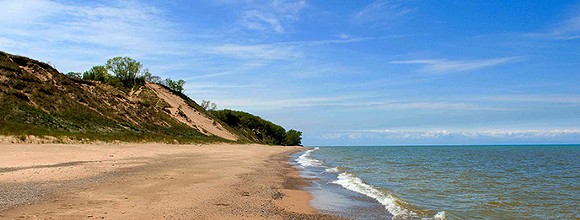I live in a beautiful place.
In my experience, most Hoosiers are only dimly aware of the part of their state that runs from Michigan City east to the Michigan border. Mileage-wise, it doesn’t amount to much; you can cover the distance on a bike and hardly break a sweat.
But, with its singing sand beaches and old oak woods, not to mention the vastness of the freshwater sea that shapes our days and cools our nights, it is easy to see why some people want to protect what’s here.
The trouble with beautiful places, of course, is that they are beautiful. Anyone can see it. It doesn’t take a lot of experience, education, or even good taste to get the beauty of a Lake Michigan sunset.
People wanting a piece of this is nothing new. Folks have been building homes and cottages here since the 1920s, when the area was promoted in Chicago. My grandparents found out about it in the late ‘40s; I’m living in the house they once rented.
The middle class was flourishing then. Not so much now. The gap between the wealthy and the rest of us is larger than it’s been since the Gilded Age.
This being a beautiful place, it figures that people with seemingly bottomless bank accounts have decided they’re entitled to own as much of it as possible. The thing is, apart from its obvious beauty, there doesn’t seem much else here that suits them. The houses aren’t big enough. Local ordinances and building codes are too strict. Environmental concerns are, well, somebody else’s problem.
And when locals have the temerity to suggest that the design of a seawall might cause the public beach to erode, or that locating a septic tank on the lake side of a new conference center-style house with multiple bathrooms could be a problem, the response is often not to ask what might be done to conform to local standards, but to sue.
Lawsuits intended to silence, harass or stiff-arm local town governance and the community feedback also known as free speech are called SLAPPs (Strategic Lawsuit Against Public Participation). SLAPPs amount to legalized bullying. They are aimed at private citizens, advocacy groups and small town governments lacking the resources or nerve to put up with the threat of a prolonged court fight.
According to an article in the Duke Environmental Law & Policy Forum, these suits rarely win on the merits. But this doesn’t make them any less intimidating. Money doesn’t just talk, it threatens.
That’s the way things were going in these parts. Then a grassroots citizens’ group enlisted the State of Indiana to help fight a lawsuit by beachfront homeowners claiming their private property went to the water’s edge. And a homegrown slate of candidates swept last year’s town council election by making an issue of local code enforcement.
This hasn’t stopped the bullying lawsuits. Not yet. But responsible governance and free speech are trying to make a comeback — which seems like the least we can do for a place as beautiful as this.
Originally published at Nuvo.net
